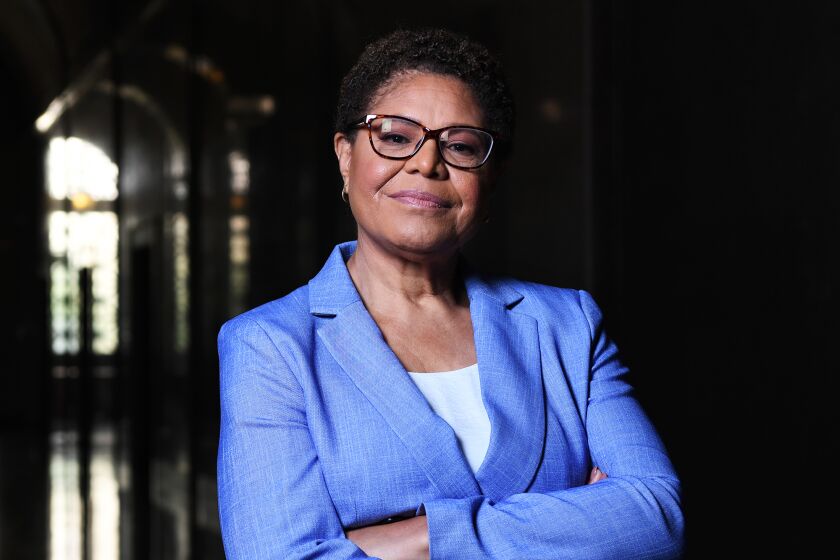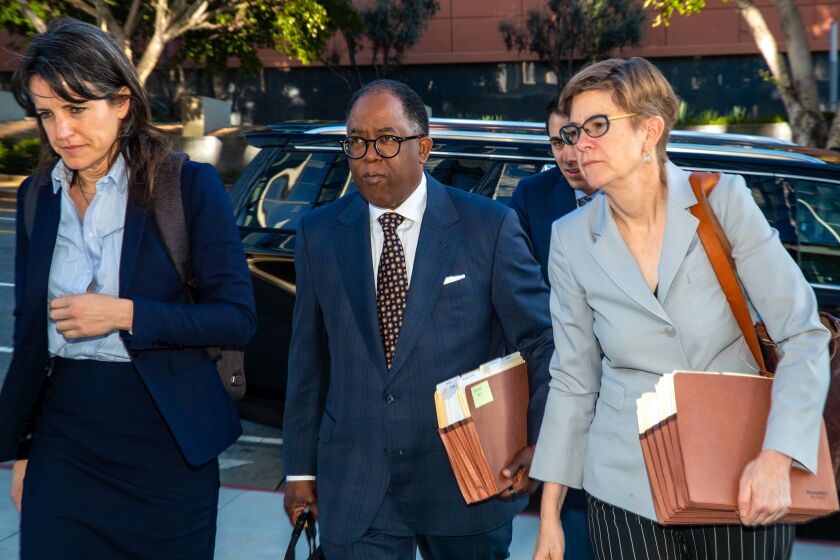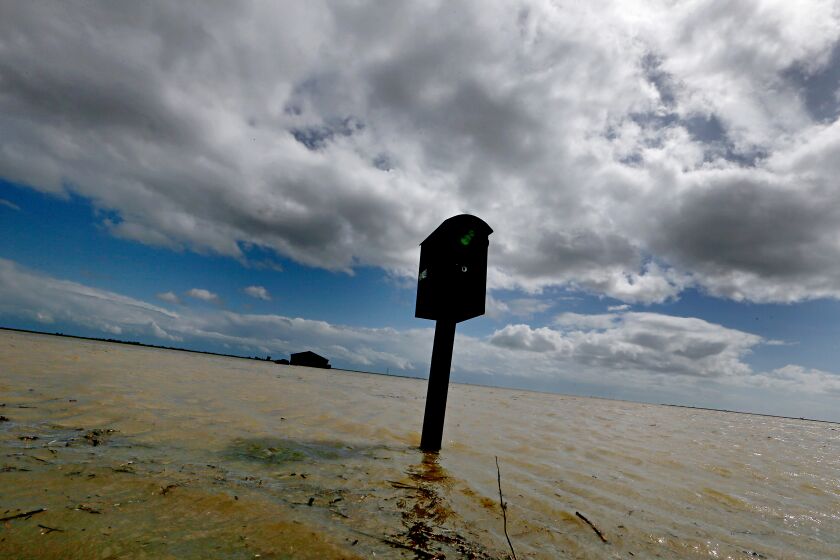Prosecutors urge conviction of Ridley-Thomas as jurors begin deliberations
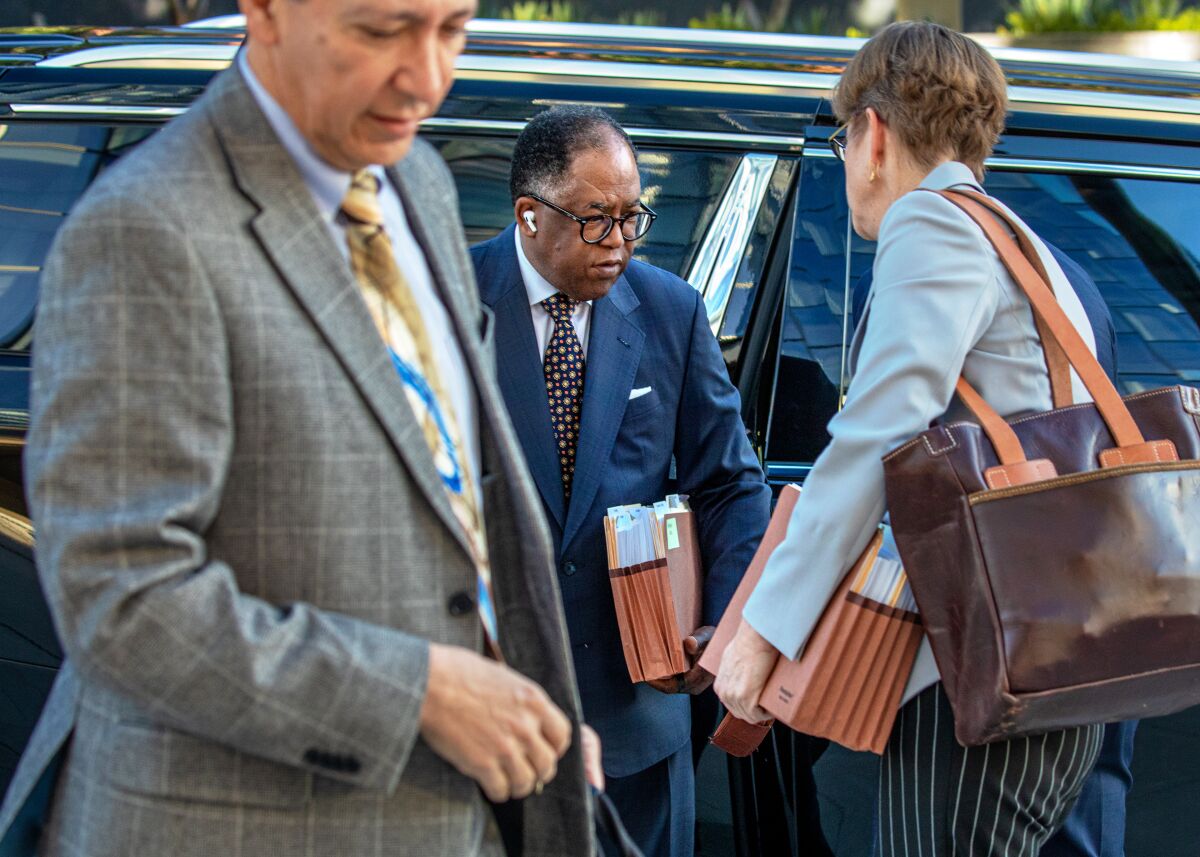
A jury drawn from a wide swath of Southern California began deliberating Friday morning whether to convict suspended Los Angeles city Councilmember Mark Ridley-Thomas of corruption charges.
Before the panel of 12 entered the deliberation room, a federal prosecutor delivered a comprehensive rejoinder to the arguments put forth by Ridley-Thomas’ defense, urging jurors to assess the evidence “by the facts, the law, and common sense” and find the veteran politician guilty.
“It is not a defense that any actions taken were good for the community or were actions that the defendant would have taken,” Assistant U.S. Atty. Michael J. Morse said.
Morse outlined how Ridley-Thomas voted and acted in ways that benefited USC’s school of social work and its former dean. “The only question for you is: Was the defendant doing these things for Marilyn Flynn so that she would do things for him?”
“The next question is: Do you think he knew that?”
Ridley-Thomas was indicted on 19 counts: one charge of conspiracy, one charge of bribery, and the rest, for honest services mail or wire fraud.
He is accused of accepting bribes from Flynn — namely, a host of benefits provided to his son — in exchange for presenting or voting on certain L.A. County agenda items and pressuring county officials to do certain acts regarding the issuing or amending government contracts. Each count of honest services mail and wire fraud is tied to an email or FedEx letter sent in late 2017 or 2018 that was done as part of the alleged scheme.
The bribery charge accuses Ridley-Thomas of accepting or intending to accept benefits from Flynn in connection with county contracts. The conspiracy charge accuses Ridley-Thomas of illicitly scheming with Flynn to engage in the honest services fraud and bribery.
His co-defendant, Flynn, previously pleaded guilty and is awaiting sentencing — but jurors in the case do not know that she was charged or entered a guilty plea.
Ridley-Thomas did not testify in his defense. What his lawyers did offer, Morse said in his 90-minute rebuttal argument on Friday, was a number of “distractions.”
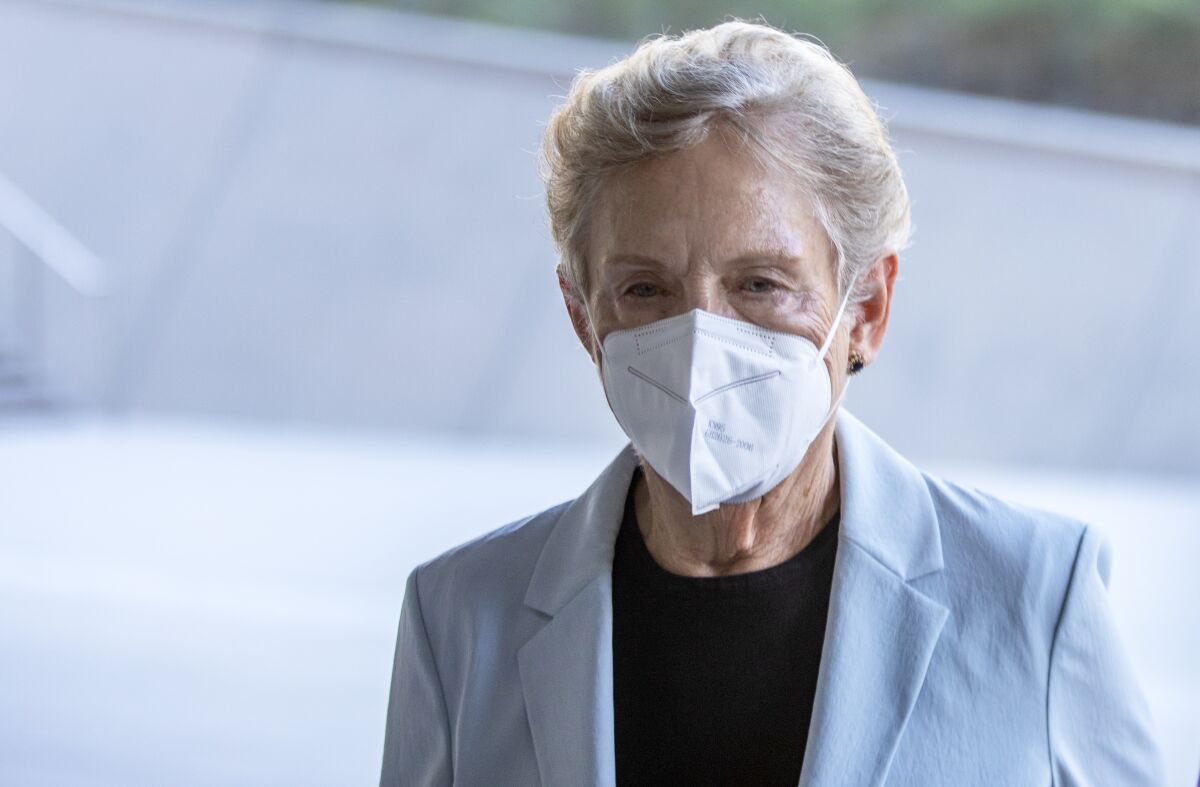
“They want to make it about everything except the defendant,” he said. Among the red herrings: vilifying the lead investigator, FBI Special Agent Brian Adkins; casting aspersions at the motives of Flynn’s underlings in sounding the alarm about her dealings with the Ridley-Thomas family; suggesting that USC had cooked up a criminal referral into Ridley-Thomas to serve some unspecified institutional agenda; and putting Ridley-Thomas’ support for key county votes in the case as less about his actions and more as the near-predestined outcome of the Blue Ribbon Commission, a report that recommended how L.A. County could better serve at-risk children.
“Most of their argument was from a keyhole view,” Morse said. What was missing from Ridley-Thomas’ defense was a credible explanation for major episodes in the case, especially the $100,000 donation that was routed through USC, he said.
Prosecutors say L.A. mayoral candidate Karen Bass’ scholarship and her dealings with USC are ‘critical’ to a case about corruption at the university.
On Thursday, Ridley-Thomas’ lawyer Daralyn Durie had claimed the $100,000 donation’s handling was more or less Flynn’s fault: She put the money in one bank account at USC, but the outgoing money that went to the politician’s son Sebastian Ridley-Thomas’ nonprofit came from another account at the university. In all of this, Durie said, her client was unaware.
“That explanation completely ignores that all of this was done at the direction of the defendant,” Morse said, showing jurors the “sham” donation letter he included with his check to USC. “That’s not an explanation at all.”
Morse tightly outlined the start of the conspiracy: in May 2017, when Ridley-Thomas reaches out to Flynn seeking a phone call, leading the two to chat for 37 minutes. The next day, Sebastian Ridley-Thomas emailed Flynn, to which the dean replies: “I am glad to hear from you — and so quickly.”
“She’s expecting this call,” Morse told jurors. The prosecutor emphasized what Flynn stood to gain: having one of the Board of Supervisors most powerful members in her corner.
“Flynn wasn’t the only one asking for things of the defendant,” Morse said. “She needs to get to the front of the line.... This is her ticket to the front of the line.”
Federal prosecutors and his defense attorney detailed sharply conflicting portraits of L.A. City Councilmember Mark Ridley-Thomas and the case against him.
To defense claims that there was no chance of bribery — that the motions voted on by Ridley-Thomas were uncontroversial, expected, and even inevitable, Morse asked why Flynn was pressing so hard for action: “If the cake is baked, why is she still in the kitchen?”
In the timeline of the prosecution, the month of December 2017 is critical. That month, Ridley-Thomas’ son, Sebastian, was facing a still-secret sexual harassment inquiry and his father feared for the damage of a #MeToo scandal in his own family, prosecutors said. They point to emails among Ridley-Thomas and his PR and legal team that evince their desperation for Sebastian to quietly exit the Legislature and find a prestigious landing spot.
In that month, one day stands out: Dec. 14. That day features Ridley-Thomas introducing Flynn to the director of L.A. County’s mental health department; Flynn telling her staff that Sebastian’s admission — along with a scholarship — must be “the highest priority”; and an email from one of Ridley-Thomas’ deputies introducing Flynn to the director of the county’s child welfare agency.
The following morning, Flynn tells a fellow USC dean to get Sebastian’s job offer out before the holidays — “to show MRT that we can deliver.” Morse highlighted that Flynn did not want to show “SRT,” the son, that the university could hold up its end of the bargain; the focus, he said, was on the father.
“It’s good to be the son of one of the five kings,” said the prosecutor, alluding to the moniker of the five-member Board of Supervisors and their control over a $30-billion budget.
The politician’s lawyers began presenting their defense Tuesday, with Sebastian Ridley-Thomas center stage.
Defense attorneys have repeatedly sought to highlight the absence of L.A. County figures from prosecutors’ case, contending it was proof of an investigation that had blindspots. Morse urged jurors to look at the weight and veracity of the testimony offered by Ridley-Thomas’ former staffers and former colleagues at L.A. County.
“They were either loyalists of the defendant, or they were out of the loop — or both,” Morse said, contending they had scant insight into or awareness of Ridley-Thomas’ backroom communications with Flynn.
Another category of Riley-Thomas’ defense were experts, including Sebastian Ridley-Thomas’ doctor, and Ann Ravel, who was offered as a campaign finance specialist who vouched for the legality of the $100,000 donation through USC.
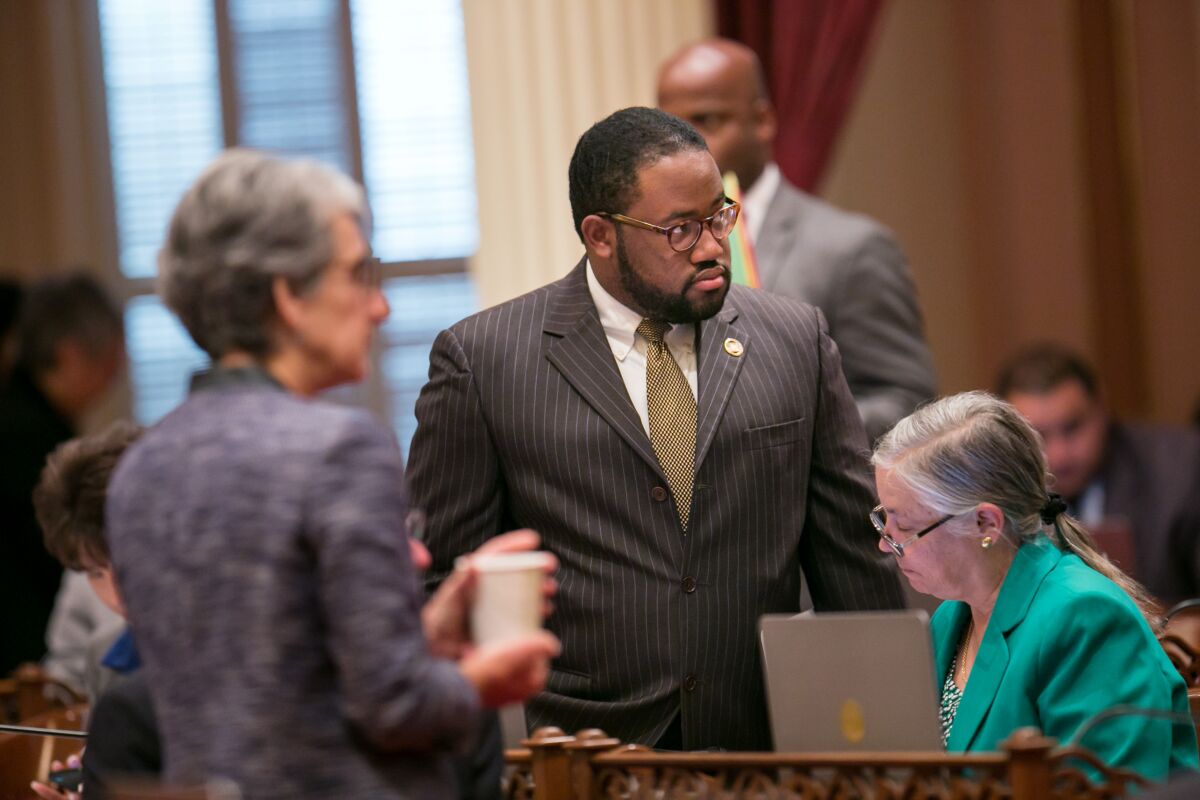
“Ann Ravel testified in a vacuum, and it appeared that she didn’t have all of the information,” Morse said. He noted how Ravel contended to be a vocal opponent of dark, untraceable money in politics — but then testified that it was legal for Ridley-Thomas to donate to USC from a ballot committee, then direct USC to donate money to his son’s nonprofit, without a paper trail.
“That transaction was designed to be disguised,” the prosecutor said. “She was here to do a job and she did it.... You don’t have to take an expert’s word on anything.”
The stories shaping California
Get up to speed with our Essential California newsletter, sent six days a week.
You may occasionally receive promotional content from the Los Angeles Times.

